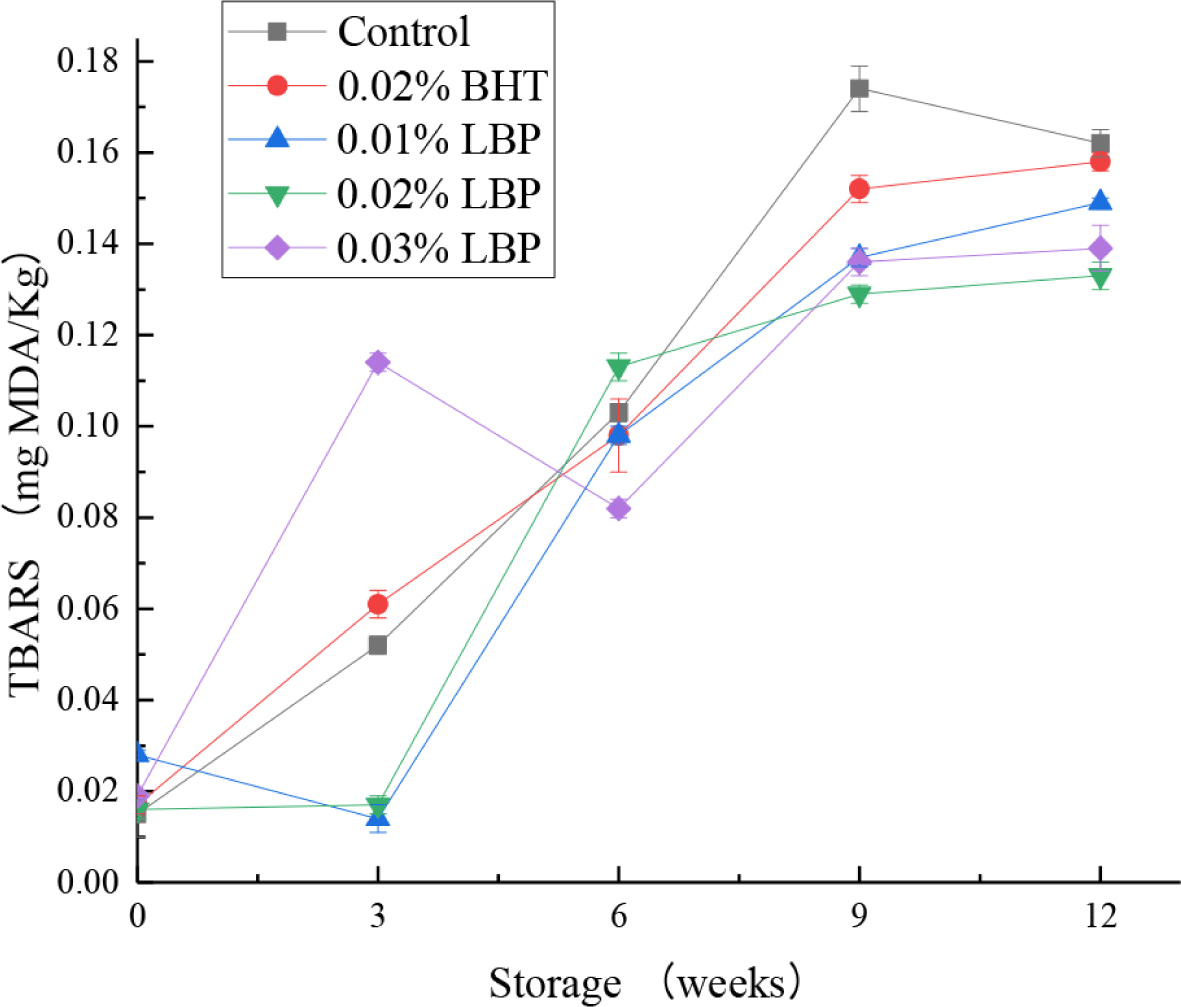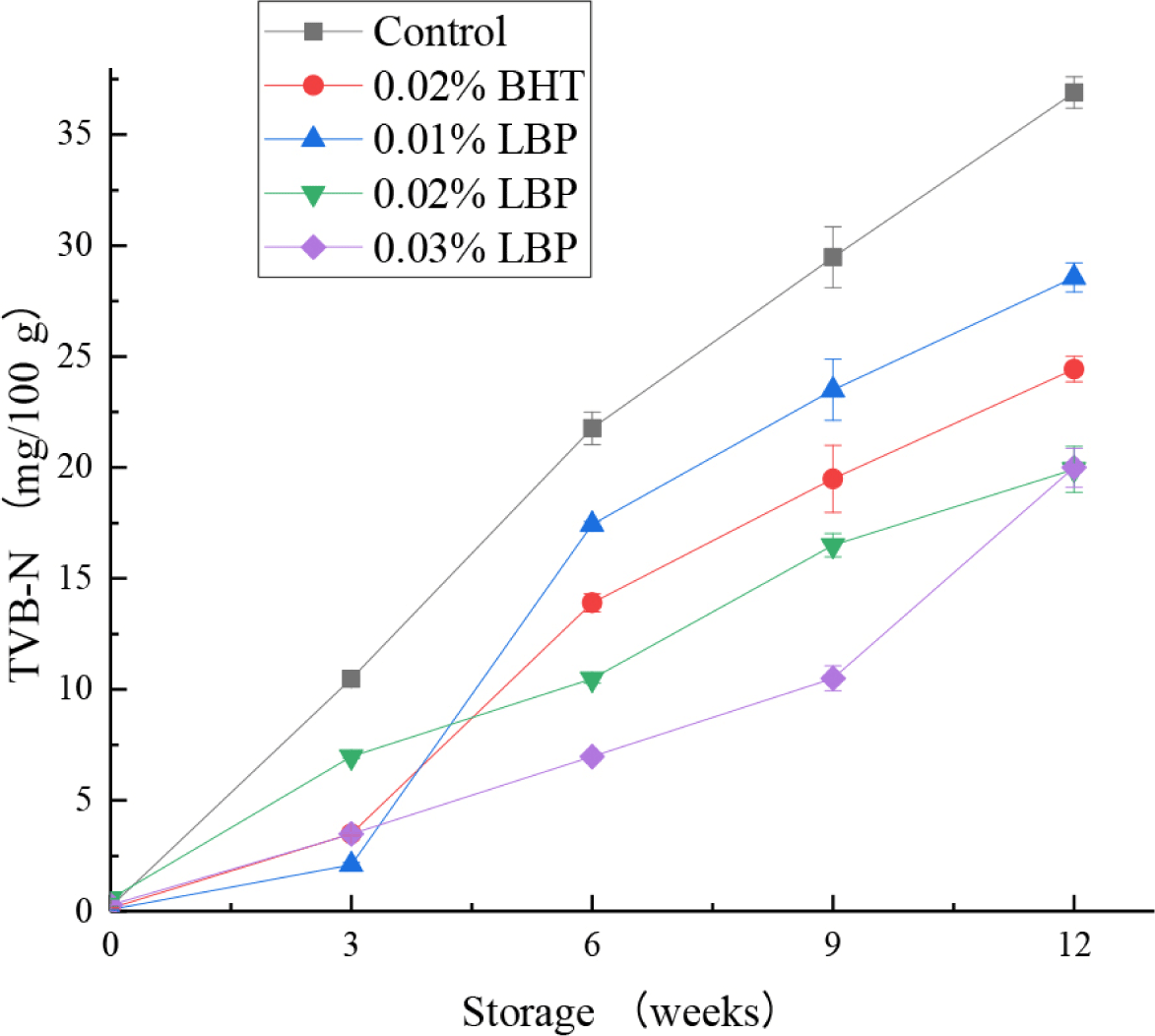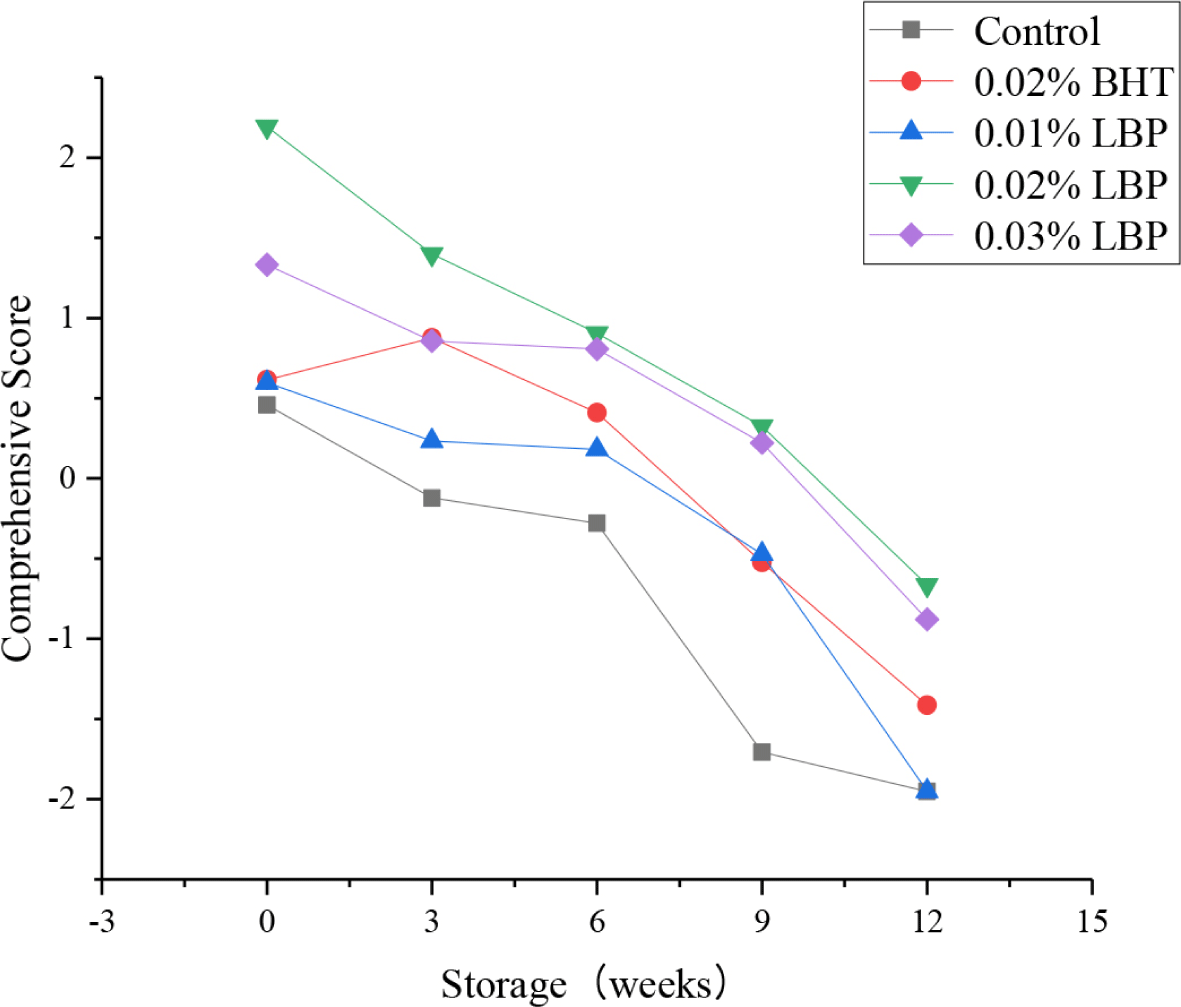Introduction
With people’s life rhythm getting quickly, people have become accustomed to enjoying instant food and prepared products. In recent years, the meatballs processed with rice, flour, vegetables, spices, seasonings, and other additives (Zhou, 2008) have become increasingly popular globally due to their unique flavour, nutritional balance, posh packaging, and convenient consumption (Oz and Cakmak, 2016). However, some deteriorations in quality and nutritional value of prepared meat products may occur during processing, storing, and transporting, including colour and flavour changes, juice loss, lipid and protein oxidization caused by microbial growth and their physico-chemical reactions, which reduce consumer acceptance as well as sensory scores of prepared meat products.
Among them, the main reason for degradation in meat products is lipid oxidation and protein degradation, result in texture variation, formation of unpleasant tastes and odours, and unhealthy substances (Jia et al., 2012). At present, oxidative reactions of prepared meat products are restrained and delayed by adding synthetic and natural antioxidants (Cömert and Gökmen, 2018). However, the requirement for natural antioxidants has been augmented gradually by reason of their safety and health characteristics (Kumar et al., 2015). Natural antioxidants are extracted from roots, leaves, stems, fruits, seeds, and peels of different plant parts (Guo et al., 2016; Jeddou et al., 2016; Kazemi et al., 2016). Thus, it is necessary to develop a new natural antioxidant to prolong shelf life and enhance qualities in prepared meat products.
Gouqi or Chinese wolfberry, Lycium barbarum L., has been generally planted in Northwest China over 2,000 years (Lu et al., 2019). It contains an abundance of active compounds, such as carotenoids, polysaccharides, organic acids, flavonoids, polyphenols, alkaloids, and fruit pigments (Zhou et al., 2017). In fact, L. barbarum polysaccharide (LBP) serves as the key bioactive substance of L. barbarum and has a high antioxidation activity among these constituents (Xia et al., 2019). Furthermore, LBP can enhance immune system function, prevent chronic diseases, and exhibit hypoglycaemic and hypolipidaemic effects (Amagase and Farnsworth, 2011; Fiedor and Burda, 2014; Zhao et al., 2015).
Therefore, this study was aimed to investigate the effectiveness of LBP on lipid oxidation and protein degradation in Tan sheep meatballs during frozen storage. The findings may provide theoretical guidance for natural antioxidant applications in prepared meat products.
Materials and Methods
Tan mutton was obtained from Xinhai Food Limited Company in Yanchi, Ningxia, China. Other excipients were bought from a local market, such as carrots, salt, and garlic, for example. The LBP standard substance (ultra value=80%) was purchased from Xi’an Shengqing Biotechnology Limited Company in Shaanxi, China.
The steps for making meatballs were as follows: First, the fresh Tan mutton was washed and connective tissues were removed. Second, the meat was minced and mixed with LBP at 0.01%, 0.02%, and 0.03%, 0.02% butylated hydroxytoluene (BHT) and other excipients (Table 1). Third, the meat was soused at 4±1°C for 20 h after mixing. Then, meatballs were made by using a forming machine in an approximate shape. Finally, the meatballs were precooked at 60±1°C for 10 min, boiled at 90±1°C for 10 min, and then stored at –18±1°C after cooling. The contents of thiobarbituric acid reactive substances (TBARS), total volatile basic nitrogen (TVB-N), colour, texture profile (TP), and pH values were determined for comparing the effects of LBP treatment with 0.02% BHT treatment and the blank control at 0, 3, 6, 9, and 12 weeks.
| Ingredients and excipients | Mass fraction (%, w/w) |
|---|---|
| Carrots puree | 50.00 |
| Salt | 2.00 |
| Garlic | 0.50 |
| Thirteen incense | 0.50 |
| Soy protein isolate | 2.00 |
| Carrageenan gel | 0.30 |
| Pentasodium triphosphate | 0.05 |
The five men and five women who are trained in food science were selected for sensory analysis of meatballs. The meatballs were evaluated from five aspects: Colour, shape, tissue, odour, and impurities. The highest score for meatballs were ten. The analysis of sensory was evaluated according to criterion for sensory evaluation of meat and meat products of the China National Standard and the IRB number is GB/T 22210-2008.
The colour of meatballs was analyzed (Ding et al., 2015) by using a Minolta Chromameter (CM-2300d, Konica Minolta, Tokyo, Japan). The colour was measured at three separate locations of the each sample, and each measurement consisted of 3 readings. The average values of triplicate measurements of L*, a*, and b* were calculated.
The TP of the meatballs was obtained using a texture analyser (TA.XT Plus, Stable Micro System, Godalming, UK) with P35 detector, 60% strain and 5 s residence time. The pre-test, mid-test, and post-test velocities were 5 mm/s, 3 mm/s, and 5 mm/s, respectively (Yu et al., 2021). All analyses were carried out in triplicate for each meatball.
The pH value of the meatballs was determined (Al-Juhaimi et al., 2016) with a Meat digital pH metre (Testo 205, Merck KGaA, Shanghai, China). The means of three replicates were calculated for each treatment.
TBARS was measured based on the China National Standard (2017). The 5 g meatballs were weighed and minced. Then, the samples were homogenized and filtered after adding butyl alcohol. Five millilitres of sample fluid were blended with 5 mL thiobarbituric acid, and then the mixture was reacted in a water bath at 95±1°C for 2 h. The absorbance values at 530 nm were measured in a spectrophotometer (UC1902PC, Lengguang Technology, Shanghai, China) after cooling at room temperature. The TBARS was obtained according to the following equation:
When the absorbance of the reagent blank was lower than 0.05, the equation was as follows:
Where A=absorbance of the sample solution, B=absorbance of the reagent blank, and m=weight (mg) of sample.
TVB-N content was measured by the China National Standard (2016a). Briefly, 20 g meatballs were minced, homogenized and filtered after adding distilled water. Then, 1 mL boric acid and 1 droplet compound indicator were added into the inter diffuser, while 1 mL sample fluid and 1 mL saturated potassium carbonate solution were mixed into the outer diffuser. Then, the diffuser was placed in an electrothermal incubator at 37±1°C for 2 h. The final sample fluid was titrated with hydrochloric acid after cooling at room temperature. At the same time, a reagent blank experiment was conducted (Goulas and Kontominas, 2007). The equation as follows:
Where V1=volume (mL) of hydrochloric acid consumed by test solution; V2=volume (mL) of hydrochloric acid consumed by reagent blank; c is the concentration (mol/L) of hydrochloric acid; m is the weight (g) of sample; V=volume (1 mL) of filtrate; and V0=volume (1 mL) of sample solution.
Data was expressed as the means±SDs and calculated with Microsoft Office Excel 2018 software. Statistical analysis was performed using the SPSS 24.0 (IBM, Armonk, NY, USA) and statistical significance was defined as two-sided p<0.05. The principal component analysis (PCA) of the main quality indicators of meatballs during storage also used the SPSS.
Results and Discussion
As shown in Table 2, the sensory qualities of meatballs were affected by: soy protein isolate>carrageenan gel>pentasodium triphosphate>carrots puree. The best composition of the Tan sheep meatballs was: A3B2C1D2.
As shown in Table 3, the a* values of each group gradually decreased with increasing storage time (p<0.05). LBP may retard the oxidation of myoglobin and the formation of metmyoglobin by delaying lipid oxidation, preventing meatballs from discolouration. Otherwise, the discolouration of meatballs was caused by nonenzymatic browning reactions between lipid oxidation products and amines in meat (Xia et al., 2009). Gantner et al. (2018) reported that the polyphenols contained in Salvia officinalis L. extract might be compressed to form darkened meat, which brought about an intense colour of meat and the low a* values.
Overall, the LBP-treated meatballs had fine colour stabilization at 12 weeks compared with the control in Table 3 (p<0.05). The a* values with 0.01%, 0.02%, and 0.03% LBP at 0 week were 14.940, 15.500, and 14.443, respectively; the a* values of 0.01%, 0.02%, and 0.03% LBP at 12 weeks were 11.517, 12.437, and 12.990, respectively. Simultaneously, the value of the control colour a* at 12 weeks was 13.333. Additionally, the a* values of all LBP-treated groups gradually decreased during storage (p<0.05) compared with the control. The reason for these results might be the addition of LBP in meatballs and in accordance with Cağlar et al. (2018). However, there were no significant correlations (p>0.05) in the L* and b* values among all treated groups. Jayawardana et al. (2015) did not observe L* and b* values in chicken sausage by treatment with Moringa leaves, and these outcomes were entirely consistent with our study.
As shown in Table 4, the springiness of meatballs was higher in the LBP-treated groups than that in the control at the end of week 12 (p<0.05). Moreover, hardness is among the most fundamental textural characteristic in meatballs. There were no significant differences among all groups for hardness during storage (p>0.05). Li et al. (2013) found that tea polyphenols and grape seed extract having abundant polyphenolic compounds, could extend shelf life and improve the textural attributes of red drum. The gumminess and chewiness of LBP-treated groups were dramatically increased during frozen storage compared with the control group (p<0.05). In summary, the rate and extent of pH decline might influence the changes of texture parameters, degradation of myofibrillar protein, and softening of the musculature (Li et al., 2012).
pH is one of the critical indicators for real-time monitoring of freshness for chilled meat (Chang et al., 2019). As shown in Table 5, the pH values of the BHT- and LBP-treated groups before the 3rd week decreased significantly with increasing storage time (p<0.05). Reduction in pH could be related to the accumulation of acidic substances during storage (Al-Juhaimi et al., 2017). However, pH values gradually increased (p<0.05) from 3 to 12 weeks in all groups, of which LBP-treated groups were more stable than the control and BHT-treated groups. pH increase might be related to the activities of corruption bacteria and endogenous enzyme.
TBARS accumulated during frozen storage (Fig. 1). TBARS contents were lower in the LBP-treated groups than in the control group. The increases of TBARS contents were slight in the antioxidant-treated groups (p<0.05), while a more rapid increase was obtained from the control group, followed by the 0.02% BHT-, 0.01% LBP-, 0.02% LBP-, and 0.03% LBP-treated groups, which reached their respective maximum values at the end of storage. The increase of TBARS contents might be put down to the denatured structure of the muscles during the storage (Cao et al., 2013). These appreciable results showed that LBP presented stable in lipid oxidation of meatballs compared with the control (Al-Juhaimi et al., 2018). However, the TBARS contents decreased in the 0.03% LBP-treated group from 3 to 6 weeks and in the control from 9 to 12 weeks (p<0.05). Pereira de Abreu et al. (2011) also found that in Atlantic halibut samples, the TBARS values increased slightly until reaching a maximum value and then decreased slowly. The TBARS content could be degraded or interacted with other components, leading to the reduction of its content (Pereira de Abreu et al., 2010).

Freezing alone could not prevent the process of deterioration in meat products. The LBP on lipid oxidation might obtain the retardant effect due to its phenolic and other compounds, which contributed to the activities of antioxidants (Qin et al., 2013) and chelate metal ions (Nishad et al., 2018). Moreover, phenolic antioxidants may prevent the formation of free radicals, which account for the reaction or absorption of oxygen in the autoxidation process (Turgut et al., 2017).
Thus, LBP shows antioxidant activity by blocking radical chain reactions during the oxidation process and may be used as antioxidant to make meat and meat products against lipid oxidation (Morsy et al., 2018). In addition, TBARS slowly accumulated with the increasing of storage time, and the structural and functional changes of these proteins may be caused by their associated lipid oxidation products (Xiong et al., 2015).
Protein degradation is one of the major causes of meat quality deterioration in addition to lipid oxidation. According to the China National Standard (2016b), the upper tolerable limit of TVB-N in fresh and frozen livestock products is 15 mg/100 g. The TVB-N values increased (p<0.05) from 0.200 to 36.890 mg/100 g and 0.070–28.556 mg/100 g in the control and each treated group, respectively (Fig. 2). The formation of TVB-N is due to the enzymatic decarboxylation of specific amino acids (Balamatsia et al., 2007). Similarly, Guan et al. (2019) found that inhibition of fishy odour by extracts from sage leaves, oregano leaves and grape seeds (SOG) was directly associated with reducing TBARS content and TVB-N value, suggesting the potential advantages for SOG in retarding fishy odour formation and improving flavour of hairtail fish balls during storage. Consequently, the effect of phenolic compounds against protein oxidation was also correlated with their interactions with proteins, which might protect proteins from attracting free radicals (Viljanen et al., 2004).

Lipid oxidation and protein degradation are catalyzed by the same compounds, which can progress independently or in parallel. Moreover, radicals, hydroperoxides and secondary oxidative compounds react with protein owing to lipid oxidation, thereby resulting in the destruction of protein functionality (Sabeena Farvin et al., 2012). Therefore, lipid oxidation and protein degradation can interact.
To further determine the quality changes of the control and all treated groups during frozen storage, the pH value, a* value, springiness, TBARS value and TVB-N content were used as the main quality indices of the meatballs, and PCA was conducted. According to the idea of PCA dimensionality reduction, the change in the sum of the five main quality indicators of meatballs during frozen storage was divided into principal components, and the characteristic value of each principal component reflects the amount of original variable information. As shown in Table 6, the first two principal components were extracted by PCA, with eigenvalues greater than 1.000 and a cumulative contribution rate of 81.221%. Based on the load matrix and eigenvalues, the eigenvectors of each PCA1 and PCA2 were calculated, as shown in Table 7. The coefficients of two principal component linear equations were established by eigenvectors. The equations were as follows:
where Xi is standardized data, i = 0, 1, 2, 3, 4, 5.
Based on the variance contribution rate of the first two principal components as coefficients, the comprehensive score evaluation equation was obtained: Y=0.51632Y1+0.29589Y2. As shown in Fig. 3, the measured values of the five main quality indicators of each group were standardized and substituted into the above equation to calculate the comprehensive score Y. The results showed that the 0.02% LBP-treated group had a higher comprehensive score than the other groups, and the quality of the LBP-treated meatballs was better as well.

Conclusion
In conclusion, lipid oxidation and protein degradation have a significant effect on the progress of oxidative reactions in Tan sheep meatballs. The results confirmed LBP to be a highly effective antioxidant in Tan sheep meatballs. It reduced TBARS contents, TVB-N values, and obtained stable colour, TP and pH during frozen storage (p<0.05). Finally, the 0.02% LBP-treated group had a higher comprehensive score than the other groups, and the quality of LBP-treated meatballs was better as well. In a word, LBP as a natural antioxidant may have great potential to inhibit lipid oxidation and protein degradation in prepared meat products in the future.













